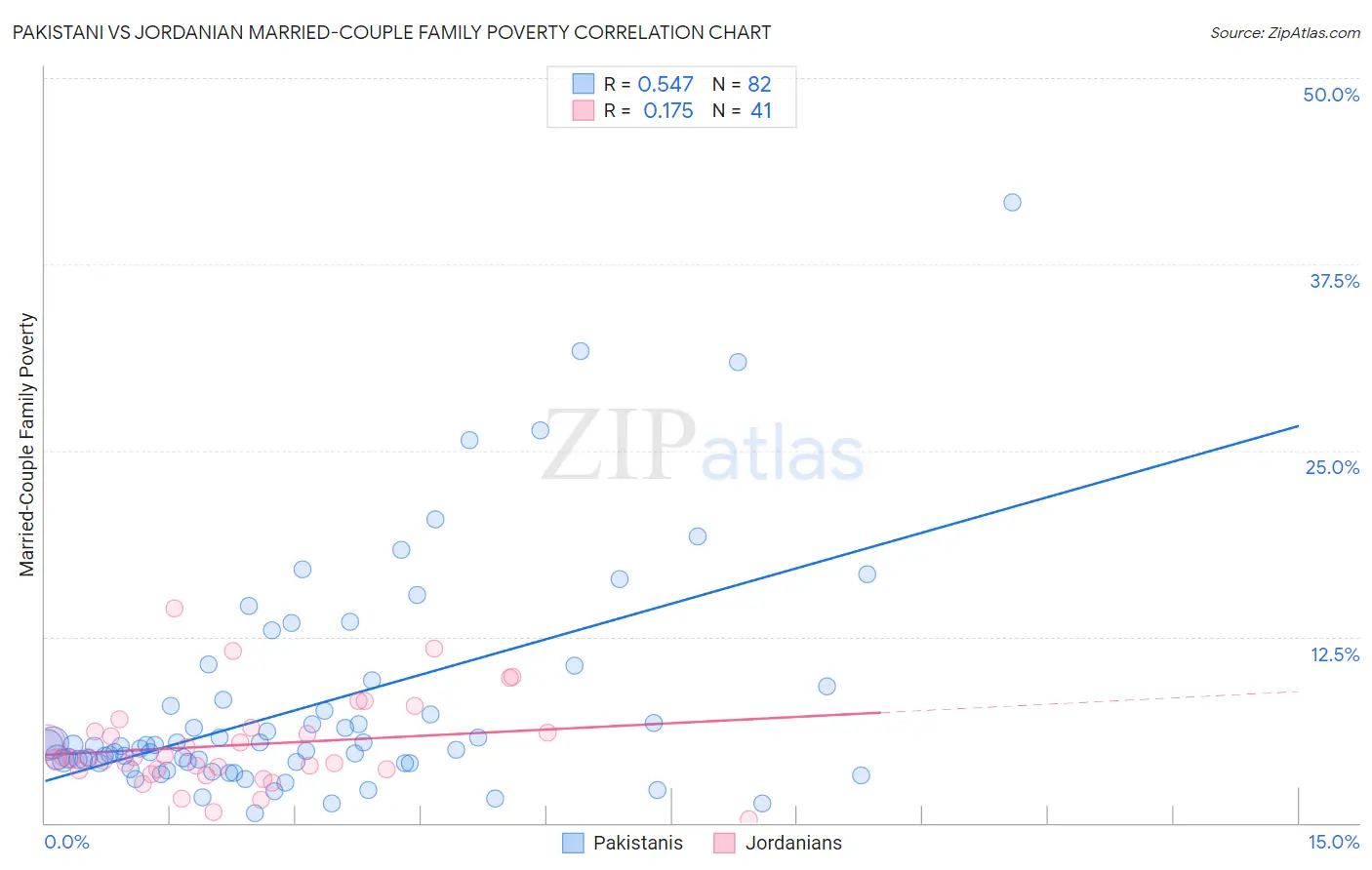Pakistani vs Jordanian Married-Couple Family Poverty
COMPARE
Pakistani
Jordanian
Married-Couple Family Poverty
Married-Couple Family Poverty Comparison
Pakistanis
Jordanians
4.7%
MARRIED-COUPLE FAMILY POVERTY
96.2/ 100
METRIC RATING
111th/ 347
METRIC RANK
4.8%
MARRIED-COUPLE FAMILY POVERTY
93.1/ 100
METRIC RATING
123rd/ 347
METRIC RANK
Pakistani vs Jordanian Married-Couple Family Poverty Correlation Chart
The statistical analysis conducted on geographies consisting of 333,416,483 people shows a substantial positive correlation between the proportion of Pakistanis and poverty level among married-couple families in the United States with a correlation coefficient (R) of 0.547 and weighted average of 4.7%. Similarly, the statistical analysis conducted on geographies consisting of 165,961,461 people shows a poor positive correlation between the proportion of Jordanians and poverty level among married-couple families in the United States with a correlation coefficient (R) of 0.175 and weighted average of 4.8%, a difference of 2.0%.

Married-Couple Family Poverty Correlation Summary
| Measurement | Pakistani | Jordanian |
| Minimum | 0.63% | 0.23% |
| Maximum | 41.7% | 14.4% |
| Range | 41.0% | 14.1% |
| Mean | 7.9% | 5.2% |
| Median | 5.2% | 4.4% |
| Interquartile 25% (IQ1) | 4.0% | 3.6% |
| Interquartile 75% (IQ3) | 8.3% | 6.3% |
| Interquartile Range (IQR) | 4.3% | 2.7% |
| Standard Deviation (Sample) | 7.6% | 3.0% |
| Standard Deviation (Population) | 7.5% | 3.0% |
Demographics Similar to Pakistanis and Jordanians by Married-Couple Family Poverty
In terms of married-couple family poverty, the demographic groups most similar to Pakistanis are Immigrants from Bolivia (4.7%, a difference of 0.040%), Tongan (4.7%, a difference of 0.18%), Immigrants from Hong Kong (4.7%, a difference of 0.20%), Immigrants from Nepal (4.7%, a difference of 0.25%), and Laotian (4.7%, a difference of 0.40%). Similarly, the demographic groups most similar to Jordanians are White/Caucasian (4.8%, a difference of 0.020%), Indian (Asian) (4.8%, a difference of 0.060%), Immigrants from Southern Europe (4.8%, a difference of 0.16%), Romanian (4.8%, a difference of 0.27%), and Immigrants from Bosnia and Herzegovina (4.8%, a difference of 0.29%).
| Demographics | Rating | Rank | Married-Couple Family Poverty |
| Immigrants | Germany | 96.8 /100 | #107 | Exceptional 4.7% |
| Laotians | 96.6 /100 | #108 | Exceptional 4.7% |
| Immigrants | Hong Kong | 96.4 /100 | #109 | Exceptional 4.7% |
| Immigrants | Bolivia | 96.2 /100 | #110 | Exceptional 4.7% |
| Pakistanis | 96.2 /100 | #111 | Exceptional 4.7% |
| Tongans | 95.9 /100 | #112 | Exceptional 4.7% |
| Immigrants | Nepal | 95.9 /100 | #113 | Exceptional 4.7% |
| Immigrants | Indonesia | 95.1 /100 | #114 | Exceptional 4.8% |
| Taiwanese | 94.8 /100 | #115 | Exceptional 4.8% |
| Celtics | 94.8 /100 | #116 | Exceptional 4.8% |
| Kenyans | 94.7 /100 | #117 | Exceptional 4.8% |
| Immigrants | Philippines | 94.6 /100 | #118 | Exceptional 4.8% |
| Immigrants | Eastern Asia | 94.0 /100 | #119 | Exceptional 4.8% |
| Immigrants | Southern Europe | 93.4 /100 | #120 | Exceptional 4.8% |
| Indians (Asian) | 93.2 /100 | #121 | Exceptional 4.8% |
| Whites/Caucasians | 93.1 /100 | #122 | Exceptional 4.8% |
| Jordanians | 93.1 /100 | #123 | Exceptional 4.8% |
| Romanians | 92.5 /100 | #124 | Exceptional 4.8% |
| Immigrants | Bosnia and Herzegovina | 92.5 /100 | #125 | Exceptional 4.8% |
| Immigrants | Asia | 92.3 /100 | #126 | Exceptional 4.8% |
| Egyptians | 92.0 /100 | #127 | Exceptional 4.8% |